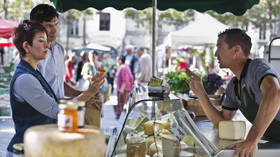
Food and energy are the main contributors to rising prices, according to official data

© Getty Images/Strauss/Curtis
Inflation in France accelerated in April, driven by a surge in energy prices, data published by the national statistics bureau Insee showed.
Consumer prices rose by 5.9% last month on an annual basis, up from 5.7% in March, the new figures revealed. Energy price growth soared to 6.8% in April after a 4.9% increase in March, mainly due to rising fuel costs.
Meanwhile, the increase in gas prices eased from the March reading of 35.6%, coming in at 22.9% higher year-on-year in April.
Food prices climbed 15% year-on-year, slightly lower than the March reading of 15.9%. The downtick was attributable to a seasonal decline in the prices of fresh goods. However, despite the slower pace of price growth, Insee economists said that soaring food costs have had a more significant impact on overall inflation than rising energy costs.
A recent survey by market research firm Elabe showed that 43% of French consumers have cut back on buying certain food items due to inflation. Among those surveyed, 43% reported having cut down on meat, 34% were buying less fish, and 27% had given up cakes and biscuits. According to the survey, most French consumers have had to adjust their shopping habits, with 44% opting for cheaper food and 30% now buying smaller quantities.
READ MORE: France vows to pursue biggest tax cheats
French Finance Minister Bruno Le Maire said in March that he expected inflation to peak this summer and then start to ease. Bank of France Governor Francois Villeroy de Galhau acknowledged that inflation across the Eurozone remains too high and continues to be the main concern and top priority for monetary policy.
In March, the French authorities introduced a so-called “anti-inflation food basket,” comprising about 50 basic items and obliged large retailers not to hike prices on these staples until June.
For more stories on economy & finance visit RT’s business section




